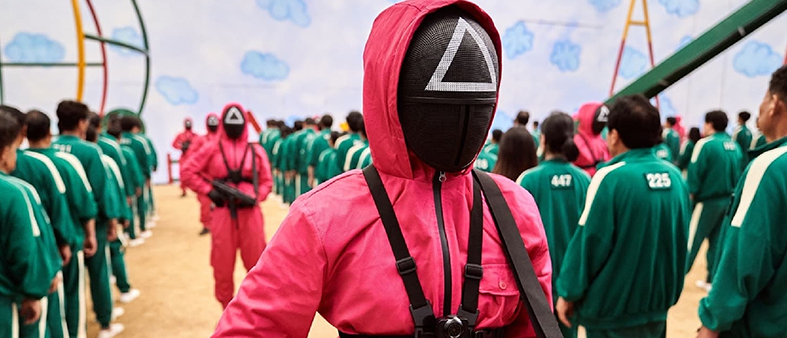
Learn Korean With Squid Game
Within a matter of days after its release on Netflix, Squid Game has gained international notoriety and acquired a massive fanbase. The worldwide craze has inspired many to take on learning the Korean language and getting to know its illustrious culture. To help you get to know Squid Game and Korea as a whole, we’ve put together a list of useful Korean phrases and cultural references that are found within the show!
9 Helpful Korean Phrases and Cultural References in Squid Game
1. Mianhae – ( 미안해 )
The Korean phrase “mianhae” is used repeatedly throughout Squid Game, often when the participants are apologizing to someone they’re close with. That’s because the phrase is used as a casual way to say “I’m sorry” without much formality attached. You can use this phrase with your Korean friends to apologize for something or add the polite suffix “yo” to the end of the phrase if you want to make it sound more polite. Mianhae is moreso used for smaller and more casual apologies in Korean; if you’re apologizing more formally, however, you might want to try its more eloquent counterpart, “joesonghabnida.”
2. Don i eopseo ( 돈이 없어요 )

A common recurring theme throughout Squid Game is the debt that seems to follow the contestants wherever they go, highlighting how difficult life can be for those who are less fortunate or have endured numerous hardships. One phrase you’ll often hear the actors repeating is “don i eopseo,” which translates to “I don’t have money” or, more literally, “there is no money.” If you ever find yourself being asked for money you don’t have in Korea, you can use this phrase to let everyone know that your wallet is empty.
3. Sajangnim ( 사장님 )
Used commonly when interacting with debt collectors or bosses within the series, you’ll probably see the word “sajangnim” translated to “sir” throughout the show; though the subtitles here aren’t exactly incorrect, the actual Korean meaning has a more specific connotation. In Korean, the honorific nim denotes respect, signaling that the person you’re talking to is of higher status or older than you are. Nim is often paired with the listener’s occupation. In this case, sajang translates to “chief of the company” or “CEO” — a respectful way for the game’s participants to communicate with their bosses or higher-ups. However, it can also be used as a respectful term to anyone who is older than the speaker and appears businesslike; in Episode 2, we see Ali use this term for Sangwoo, even though Sangwoo isn’t his boss. You may also hear other words with the polite honorific nim attached, showcasing how Korean speakers will often attach the nim suffix to an occupation rather than a name.
4. Hyung – (형)
Another honorific to add to our list! While sajangnim is a formal way of addressing someone older or of higher status, hyung is a more casual and intimate honorific used between close male friends with a brotherly connotation. In the context of Squid Game, the transition from nim to hyung denotes the closer proximity of the characters’ relationships to one another, especially between older and younger people. With that being said, it’s usually up to the older member of the pair to decide when this switch is appropriate; Sangwoo is the one who tells Ali to call him hyung, not the other way around. This ties heavily into respectful social customs that are maintained between older and younger people in Korean society.
5. Mugunghwa Kkoci Pieot Seumnida – ( 무궁화 꽃 이 피었 습니다 )
This phrase is infamous among Squid Game fans for being the creepy sing-song chant the doll repeats during the first game. Though the phrase is often used by children playing red-light green-light, the words repeated actually have nothing to do with the game they are often associated with. Mugunghwa kkoci pieot seumnida translates to “the hibiscus flower bloomed” in English. Though seemingly unrelated to children’s games and nursery rhymes, the hibiscus is actually South Korea’s national flower, known to represent eternity and immortality — considering the violent eliminations the players face during the red-light green-light scene, this cultural context makes the phrase all the more creepy when you hear it sung over and over!
7. Josimhae – ( 조심해 )
You might have heard this phrase repeated a few times throughout Squid Game when players are advising one another to be more cautious or take care. That’s because josimhae translates to “be careful” and is often employed when someone is placed in a precarious situation. Simple and easy to use, this phrase is a helpful addition to any Korean learner’s toolkit — just be sure to add the polite suffix “yo” to the end so you don’t sound rude!
8. Eotteokhae – ( 어떡해 )
A common phrase among native Korean speakers and learners alike, eotteokhae is often used to ask others, “What should I do?” If you watch other Korean TV shows, you’ll probably hear this phrase often repeated as an exclamation when something unfortunate or unplanned happens. Be sure not to get confused with the homophone eotteoke, which is used to ask how to do something. Though they sound similar, the tone of voice the speaker uses will probably clue you into which phrase they intended to say!
9. Dalgona / ppopgi – ( 달고나 / 뽑기 )

Remember the brown candy that the contestants had to carve out during the second game? The sugary treat is more commonly referred to as dalgona or ppopgi, and is known to be a traditional Korean sweet sold commonly by street vendors. The candy is made of a simple mix of melted sugar and baking soda, stirred together and flattened into fun shapes by a mold. The shapes we see in Squid Game are the more traditional ways of eating ppopgi, but the honeycomb-toffee flavor associated with this simple snack has been integrated into other food items, too; nowadays, you can find dalgona recipes online that make it easy to add the sweet, crunchy flavor to just about anything.
Korean Language and Pop Culture
Squid Game’s international appeal has shown us just how much language and pop culture are linked. Whether you watched the show only for entertainment value or to practice your Korean comprehension skills, getting to know these short Korean phrases may help you appreciate this gripping Netflix series all the more!
Learn Korean and Skip the Subtitles
Discover how speaking a new language changes everything. Experience life-changing adventures. Create unforgettable memories. Easy listening, rewarding results in just 30 minutes a day!
Give us 30 minutes a day, and we’ll have you speaking your new language in no time. That’s all it takes for you to confidently inquire about prices, order dinner, and ask for (or offer) directions – in your new language – with a near-native accent. Just listen, respond, and learn to converse in … Spanish while cooking … Korean while jogging … French while driving. It’s really that portable and flexible.
So what are you waiting for? When it comes to building actual conversational skills, nothing compares to the proven Pimsleur Method.
No Comments for "Nine Korean Phrases You Need to Understand Squid Game"